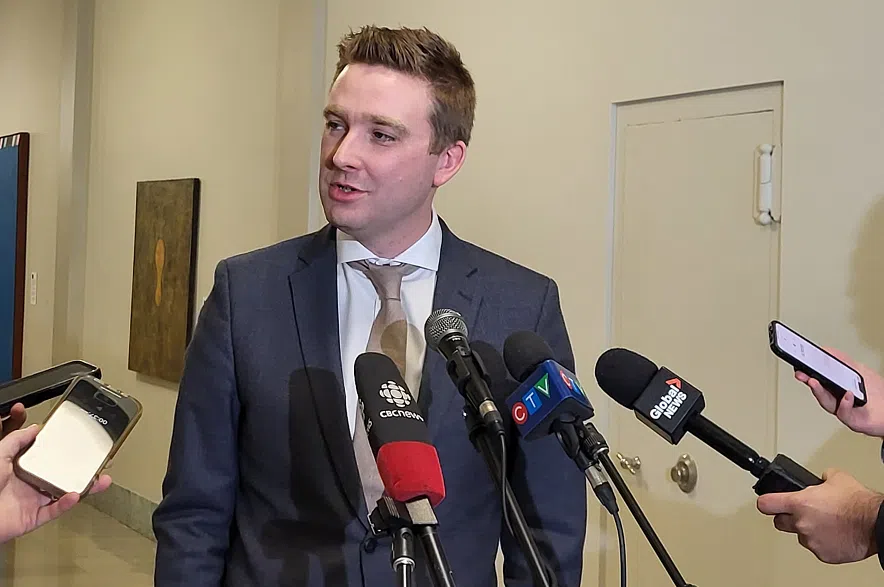The Government of Saskatchewan says it’s committing to ensure long-term, sustainable funding is available for classrooms in the province.
According to the Ministry of Education, the government has signed a multi-year agreement with the Saskatchewan School Boards Association (SSBA) to guarantee a base amount of $356.6 million for classroom supports each year over the next four years.
The move comes in the midst of a contract dispute between the province and the Saskatchewan Teachers’ Federation (STF), which has so far seen sanctions including rotating strikes and the withdrawal of noon supervision and support for extracurriculars. More sanctions are planned for next week.
The increased funding for education will be included in the upcoming provincial budget, Premier Scott Moe announced on Wednesday, saying he was pre-empting his government’s own budget in an effort to address teachers’ concerns around class size and composition.
Moe called on the STF to suspend its sanctions and return to the table in light of the increased funding intended to address those concerns.
STF president Samantha Becotte responded by accusing Moe of “avoiding accountability,” and said that budgetary funding could be clawed back at any time unless it’s enshrined in the teachers’ collective agreement. In an interview with Evan Bray on Thursday, Moe countered by saying the government is accountable to taxpayers and voters for funding included in the budget.
“The Saskatchewan Teachers’ Federation has been clear: We will not return to the bargaining table until government and Saskatchewan School Boards Association are willing to include a firm, irrevocable commitment in the collective agreement,” Becotte said in a statement.
With Friday’s announcement, it appears the province is enshrining the increased education funding into a long-term agreement, but with the school boards, which will receive the funding rather than with the teachers’ union.
“This agreement provides a written guarantee, signed by the government, for long-term funding for classroom supports — funding that will address important issues like classroom size and complexity,” Education Minister Jeremy Cockrill said in a statement.
Jeremy Cockrill, Saskatchewan’s education minister, speaks to reporters in Regina. (Daniel Reech/980 CJME)
“Now that our government has made this unprecedented commitment in a signed agreement, it’s time for the Saskatchewan Teachers’ Federation to end their job action and return to the bargaining table, so that students and teachers can return to the classroom.”
Both Cockrill and the SSBA have previously said that class size and complexity are best managed at the local level by elected school boards, and shouldn’t be included in a teacher contract. Becotte called those comments “disappointing.”
SSBA president Jaimie Smith-Windsor said the announcement from the province is encouraging and the funding amount is significant.
Smith-Windsor said the multi-year funding agreement provides a long-term commitment for funding that offers stability, sustainability and consistency.
“That’s going to go a long way into being able to plan and build back some of those supports that are really needed in our classrooms,” she said.
“School boards have been asking for that for a number of years, so it’s encouraging to see these dollars being committed.”
Smith-Windsor is glad for the autonomy that will be provided to school boards under the agreement to implement dollars as needed directly into classrooms and relieve pressures in the areas seeing need.
With regards to the present negotiations that are ongoing between Saskatchewan teachers and the provincial government, Smith-Windsor sees the funding as an important first step.
“I think it does respond to what we are hearing from teachers, what we are hearing from the community and the common acknowledgement that we need to direct dollars directly to the classroom,” she said.
She noted the “important piece of relationship” included in the agreement, in the form of willingness from the Ministry of Education and school boards to work collectively and collaboratively towards solutions thanks to the predictable funding.
“This is going to go a long way to direct those supports to where they’re needed most,” Smith-Windsor said.
The shared commitment, she added, shows a collective responsibility among those involved to enhance education outcomes and provide classroom support across the province.
Smith-Windsor said the early commitment will allow boards to work ahead of budget day to lay down pieces of the puzzle in planning out where to begin allocating the funds.
Becotte disappointed but not surprised
During a virtual media conference Friday, Becotte called the agreement between the province and the SSBA a “disappointment” but said she’s not surprised by the deal.
Becotte told reporters the Ministry of Education is delaying the dispute between both parties.
According to the union, the deal was presented to school board trustees with only 24 hours to consider whether the agreement would be endorsed or not.
“It seems that government and SSBA leadership painted a picture to local trustees that gave them no other option (than) to accept this backdoor agreement,” she said.
Becotte reiterated her previous statement agreeing with Cockrill that the best deals happen at the bargaining table, but said the minister’s words and actions “don’t align.”
Still, she said the union is prepared to return to the bargaining table if the province is willing to provide an agreement assuring that school boards can’t use these new funds for anything other than student support such as class size and complexity.
— With files from 650 CKOM’s Libby Gray and Mia Holowaychuk












